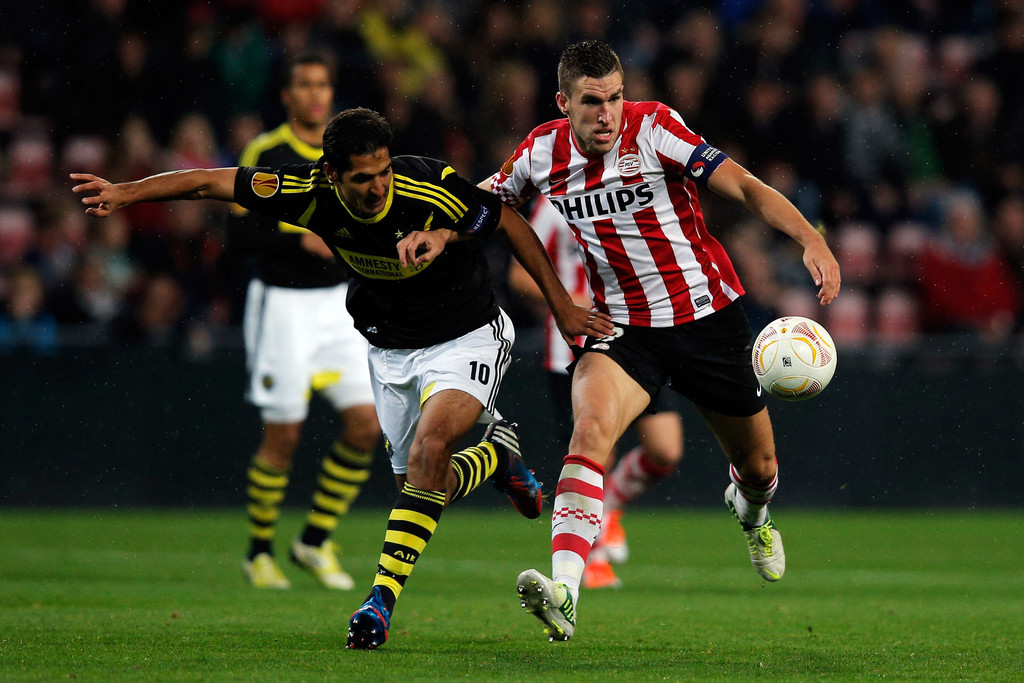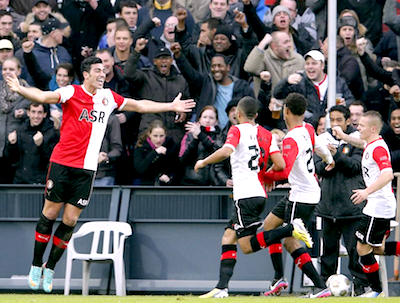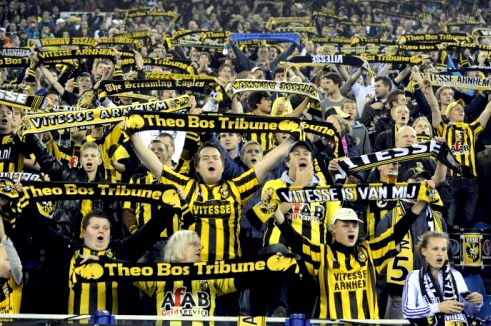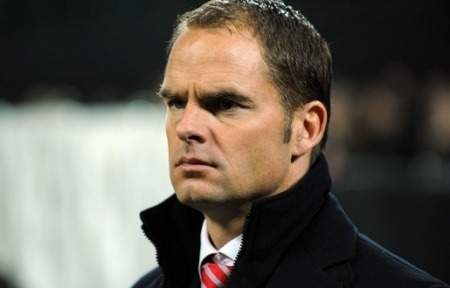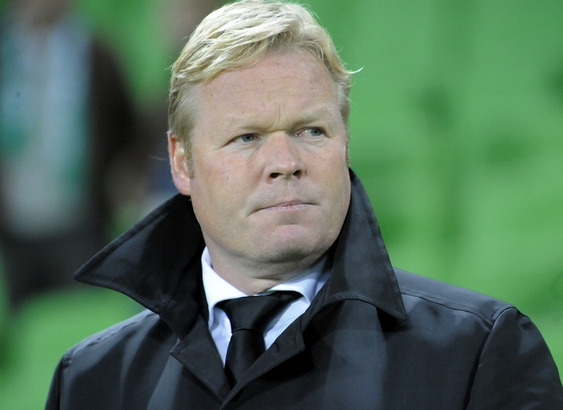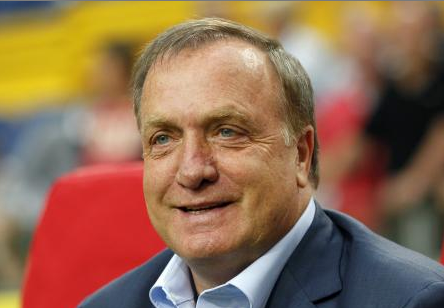As Europe searches for drama, the Eredivisie’s title race rises
As Europe searches for drama, the Eredivisie’s title race rises

As Europe searches for drama, the Eredivisie’s title race rises
With seven games remaining in the Eredivisie the destination of the championship is no clearer than it was at the beginning of the campaign. At this time of writing four sides are in contention separated by three points making this the most eagerly anticipated climax to any of Europe’s major leagues. Like the season finale of a gripping television drama series, its one not to be missed.
How this has come about is attributed to a new economic reality, one that has slowly weakened Dutch clubs, as a result the gap between the traditional old guard (consisting of Ajax, Feyenoord and PSV) and majority of the division isn’t as wide as it once was. You get the feeling this season won’t be a one-off.
So far, the ‘big three’ have combined dropped points (not including Vitesse) to twelve other teams, only the bottom two Willem II and VVV haven’t inflicted damage, nonetheless those three sides along with Vitesse are the protagonists in this season’s epic finale.
Though the cream rises to the top it’s not been straightforward. How different things were. Dutch football in the last decade has gone through a difficult phase. The origins can be traced back to the ‘Bosman ruling’, and globalising of the game, which subsequently forced clubs to effectively become selling ones.
Whilst squads in most parts of Europe are rich in experience, their counterparts in the Netherlands continue to become younger and inexperienced (resulting in their failure to compete on the European stage). Possessing talents destined for greatness, is one thing, but soon as they gain invaluable experience and start living up to their promise, they leave for pastures new resetting the vicious cycle, forever weakening sides keeping them in a state of suspended animation.
It doesn’t help with the Eredivisie being one of the poorest leagues in Western Europe, foreign players at their peak, or near to, are reluctant to move, seeing it as a step down – financially as well as competitively – further strengthening its reputation as a development league.
Many ask what can be done and the answer, unfortunately, is nothing. You’re only as strong as the league you play in. This is why English, Spanish and German clubs will continue to dominate the European landscape occasionally threatened by sides from Italy, Portugal, Russia, Ukraine and France.
The assertion this is only a blip becomes increasingly difficult to justify. This season’s abject showing in Europe can be attributed to many factors, some of which outlined above; consequently it’s played a pivotal role – when looking at the bigger picture – in enabling the downward spiral of the past decade, accelerating rapidly in the last few months, without an end in sight and close to the nadir.
The introduction of financial fair play has many observers believing it will lead to better days. It may end up as nothing but false hope. It’s hard to see Dutch sides, as a collective more economically healthy than most of their European counterparts, challenging for honours and FFP affecting the status quo.
As a great thinker once said “every disadvantage has its advantage.” Dutch football’s decline in Europe has only strengthened its top flight championship. The youthfulness of squads and a great deal more competition is the Eredivisie two major unique selling points.
Frank Rutten, managing director of the Eredivisie, last year commented on his pride the Dutch title is openly fought between more than two sides unlike in other parts of Europe. This lead to a bumper new domestic television deal, signed with News Corporation last summer, worth €1bn spanning over twelve years starting next season.
A deal which could down the road lead to squads staying intact longer than today’s average – lessening the severity of the vicious cycle – with better wages available for players, prolonging their departure.
News Corp, from afar, saw the rise in subscribers to Eredivisie Live – the pay-TV channel owned by all 18 clubs, which is accessed in more than 350,000 households – which they now own 51%. And with around seven million people nationally interested in football there’s potential for growth. An open league sweetens the deal.
Even though the damage is irreversible it hasn’t meant clubs have resigned to their fate. The size of the league and country is a millstone around the neck and historical success is a testament to ingenuity of clubs.
And that ingenuity has once again been shown domestically. The teams live within their means, in a modest league, with model academies. “Those who are not wealthy must be creative,” as Johan Cruyff said. Ajax and Feyenoord have led the way. Cruyff and his close friend Wim Jansen, in a joint interview with De Telegraaf over the Christmas period, praised managers Frank de Boer and Ronald Koeman, both agreed the future of Dutch football is now being shaped at the nations two most celebrated and important clubs, an example for every club. Both clubs are heavily reliant on their academies.
In an age where clubs are starting to lose their identity both clubs are doing the utmost to preserve theirs with an unwavering commitment to youth football and development of talents central to their sporting policy. “Both clubs do what should be the case in the Netherlands: train and improve players, rather than spend millions,” Koeman put forward. “Ajax, especially after the return of Cruyff, is doing what they once were famed for.”
This vision, not a bad one to have, won’t bring them success in Europe – in the short term – but it’s been central to Feyenoord’s renaissance. No one could have predicted when Koeman arrived in the summer of 2011 where Feyenoord would be now; giants they may be, the club on the river Meuse weren’t expected to finish as league runners-up – given their recent plight – a feat never achieved since the 2000/01 campaign (their last championship in 1999). A squad heavily constructed from the playing fields of Varkenoord are now serious title contenders.
Ajax a point ahead of PSV and Feyenoord, further three more to Vitesse, are the favourites, as they were from day one, the Amsterdammers are going for a three-peat under De Boer, their experience and resilience in the final stages is showing once again.
PSV, similar to Ajax and Feyenoord, over the last few years gone through a period of soul searching, it will be five years without the championship this May if they fall short again. Unthinkable a decade ago, when they were the unilateral power, winning seven titles inside nine seasons including four in a row from 2005 to 2008. The arrival of Dick Advocaat has not only brought the ruthless streak that has symbolised previous great PSV sides, but a similar air of confidence that symbolised Guus Hiddink’s second tenure (2002-06)
Vitesse, the dark horses, know the pressure is on the ‘big three’ and can quietly go about their business with a ‘whatever will be, will be’ mindset. A fourth place finish should however satisfy owner Merab Jordania, who set it as a target this year on arrival back in 2010. He’ll no doubt take a great deal of confidence knowing the side from Arnhem is now a major player in the Netherlands.
The powers that be in Zeist (headquarters of the KNVB) can be content their league hasn’t been decided, it could by the time PSV and Ajax finish their game on April 14, however netruals are hoping for a repeat of the final day in 2006/07.
Arguably the most dramatic conclusion: three sides – AZ (leaders on goal-difference), Ajax and PSV started level on 72 points. PSV would eventually triumph – AZ cataclysmically losing to relegation threatened Excelsior – ahead of Ajax by a solitary goal ultimately scored by club icon Phillip Cocu in his final game for the club against Vitesse, in charge that day Ronald Koeman.
Mohamed Moallim is a Dutch football expert and regular contributor to AFR. You can follow him on twitter at @jouracule. Comments below please.

